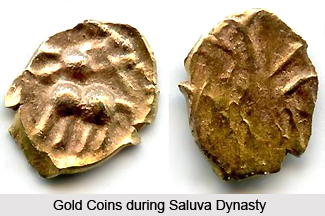 Saluva Narasimha Deva Raya was the king of the Vijayanagar Empire and belonged to the Saluva Dynasty. He ruled the kingdom of Vijayanagar from 1486 to 1491 CE. He was known to be a great patron of the Indian saint named Sripadaraya who had composed `Rama Bhyudayam`, a Sanskrit literary work. The Kannada poet Kavi Linga was also encouraged by this ruler. During the year 1452, he was granted the title of `Maha Mandaleshwara of Chandragiri`, during the regime of the king Mallikarjuna Raya. Saluva Gunda, his father was the then governor of Chandragiri.
Saluva Narasimha Deva Raya was the king of the Vijayanagar Empire and belonged to the Saluva Dynasty. He ruled the kingdom of Vijayanagar from 1486 to 1491 CE. He was known to be a great patron of the Indian saint named Sripadaraya who had composed `Rama Bhyudayam`, a Sanskrit literary work. The Kannada poet Kavi Linga was also encouraged by this ruler. During the year 1452, he was granted the title of `Maha Mandaleshwara of Chandragiri`, during the regime of the king Mallikarjuna Raya. Saluva Gunda, his father was the then governor of Chandragiri.
The Vijayanagar empire witnessed considerable neglect and downfall, following the death of Virupaksha Raya II and the accession of Prauda Deva Raya to the throne of this region. Tuluva Isvara`s son Tuluva Narasa Nayaka was sent to Vijayanagara to establish a military coup, which was believed to be the only hope to rescue the empire. Soon, Prauda Raya lost his control over the empire, which marked the rule of Saluva Narasimha. Narasimha Saluva made attempts to expand his kingdom through some conquests, but experiences opposition from some rebellious chieftains. Within the year 1491, Saluva Narasimha was defeated by Gajapati Kapilendra, the king of Orissa and thus lost the area of Udayagiri to him. He continued facing political danger from the Sambetas of Peranipadu in Cuddapah, Santharas of Karkala who ruled the coastal portions of Karnataka, Saluvas of Hadavalli and the Chiefs of Ummattur.
Saluva`s battle with the Gajapati rulers of Orissa was followed by negative consequences since he was attacked, defeated and taken prisoner in the battle of 1489. However, he was eventually released from imprisonment after he had surrendered the fort and some adjoining areas of his empire to the Gajapatis. The western ports of Bakanur, Bhatkal, Mangalore and Honnavar were conquered by Saluva Narasimha. This conquest permitted him to conduct trade with the Arabs, which concerned horses. His army and cavalry was given importance and developed.
He died in the year 1491. Since his sons were not mature enough to succeed him, Narasa Nayaka a royal mister belonging to the Teluva family looked after them.



















